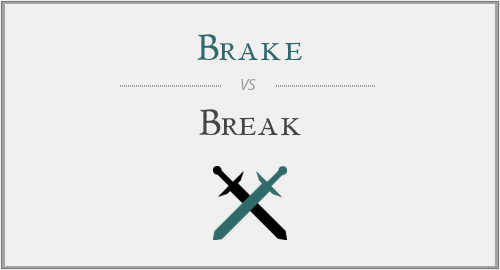English language is filled with difficult and puzzling type of words. One of the type of words is homophones that are pronounced the same way but mean and spell differently. The words we are discussing today are one of the common pairs of homophones; break and brake.
With the help of this article, I will illustrate the difference between the two words, highlighting their contextual meanings. At end, I would explain a useful trick to help you utilize both of the words accurately in your writing instantly.
Origin:
Break originated from Old English brecan(verb), of Germanic origin; related to Dutch breken and German brechen, from an Indo-European root shared by Latin frangere ‘to break’. Brake originated from late Middle English: possibly related to Middle Low German brake and Dutch braak, and perhaps also to break
Break as verb:
Break is used as a verb which means to separate into pieces as a result of a blow, shock, or strain.
Break also means to interrupt (a continuity, sequence, or course).
To fail to observe (a law, regulation, or agreement) is also termed as break.
To crush the emotional strength, spirit, or resistance of.
Break as noun:
Break is used as a noun which means an interruption of continuity or uniformity.
Brake as noun:
Brake is noun which means a device for slowing or stopping a moving vehicle, typically by applying pressure to the wheels.
Brake as verb:
Brake is used as a verb which means to make a moving vehicle slow down or stop by using a brake.
Examples:
Break or brake:
Both the words even though sound the same, they have different meanings with different use in the English language. Brake is both a verb and a noun. As a noun, it is a word used as mechanic device to stop a vehicle and to carry out that action out is considered a verb. Remember, a person breakdowns when his brakes fail.





Have a discussion about this article with the community:
Report Comment
We're doing our best to make sure our content is useful, accurate and safe.
If by any chance you spot an inappropriate comment while navigating through our website please use this form to let us know, and we'll take care of it shortly.
Attachment
You need to be logged in to favorite.
Log In